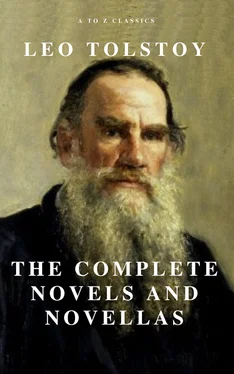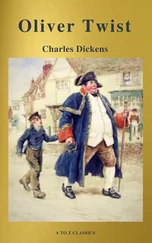Leo Tolstoy - Leo Tolstoy - The Complete Novels and Novellas (Active TOC) (A to Z Classics)
Здесь есть возможность читать онлайн «Leo Tolstoy - Leo Tolstoy - The Complete Novels and Novellas (Active TOC) (A to Z Classics)» — ознакомительный отрывок электронной книги совершенно бесплатно, а после прочтения отрывка купить полную версию. В некоторых случаях можно слушать аудио, скачать через торрент в формате fb2 и присутствует краткое содержание. Жанр: unrecognised, на английском языке. Описание произведения, (предисловие) а так же отзывы посетителей доступны на портале библиотеки ЛибКат.
- Название:Leo Tolstoy: The Complete Novels and Novellas (Active TOC) (A to Z Classics)
- Автор:
- Жанр:
- Год:неизвестен
- ISBN:нет данных
- Рейтинг книги:5 / 5. Голосов: 1
-
Избранное:Добавить в избранное
- Отзывы:
-
Ваша оценка:
- 100
- 1
- 2
- 3
- 4
- 5
Leo Tolstoy: The Complete Novels and Novellas (Active TOC) (A to Z Classics): краткое содержание, описание и аннотация
Предлагаем к чтению аннотацию, описание, краткое содержание или предисловие (зависит от того, что написал сам автор книги «Leo Tolstoy: The Complete Novels and Novellas (Active TOC) (A to Z Classics)»). Если вы не нашли необходимую информацию о книге — напишите в комментариях, мы постараемся отыскать её.
– Childhood
– Boyhood
– Youth
– Family Happiness
– The Cossacks
– War and Peace
– Anna Karenina
– The Death of Ivan Ilyich
– The Kreutzer Sonata
– Resurrection
– The Forged Coupon
– Hadji Murad
Leo Tolstoy: The Complete Novels and Novellas (Active TOC) (A to Z Classics) — читать онлайн ознакомительный отрывок
Ниже представлен текст книги, разбитый по страницам. Система сохранения места последней прочитанной страницы, позволяет с удобством читать онлайн бесплатно книгу «Leo Tolstoy: The Complete Novels and Novellas (Active TOC) (A to Z Classics)», без необходимости каждый раз заново искать на чём Вы остановились. Поставьте закладку, и сможете в любой момент перейти на страницу, на которой закончили чтение.
Интервал:
Закладка:
At carnival time Nechludoff was so much taken up with one festivity and another that, though he came to see us several times a day, he never addressed a single word to me. This offended me so much that once again I found myself thinking him a haughty, disagreeable fellow, and only awaited an opportunity to show him that I no longer valued his company or felt any particular affection for him. Accordingly, the first time that he spoke to me after the carnival, I said that I had lessons to do, and went upstairs, but a quarter of an hour later some one opened the schoolroom door, and Nechludoff entered.
“Am I disturbing you?” he asked.
“No,” I replied, although I had at first intended to say that I had a great deal to do.
“Then why did you run away just now? It is a long while since we had a talk together, and I have grown so accustomed to these discussions that I feel as though something were wanting.”
My anger had quite gone now, and Dimitri stood before me the same good and lovable being as before.
“You know, perhaps, why I ran away?” I said.
“Perhaps I do,” he answered, taking a seat near me. “However, though it is possible I know why, I cannot say it straight out, whereas YOU can.”
“Then I will do so. I ran away because I was angry with you — well, not angry, but grieved. I always have an idea that you despise me for being so young.”
“Well, do you know why I always feel so attracted towards you?” he replied, meeting my confession with a look of kind understanding, “and why I like you better than any of my other acquaintances or than any of the people among whom I mostly have to live? It is because I found out at once that you have the rare and astonishing gift of sincerity.”
“Yes, I always confess the things of which I am most ashamed — but only to people in whom I trust,” I said.
“Ah, but to trust a man you must be his friend completely, and we are not friends yet, Nicolas. Remember how, when we were speaking of friendship, we agreed that, to be real friends, we ought to trust one another implicitly.”
“I trust you in so far as that I feel convinced that you would never repeat a word of what I might tell you,” I said.
“Yet perhaps the most interesting and important thoughts of all are just those which we never tell one another, while the mean thoughts (the thoughts which, if we only knew that we had to confess them to one another, would probably never have the hardihood to enter our minds)— Well, do you know what I am thinking of, Nicolas?” he broke off, rising and taking my hand with a smile. “I propose (and I feel sure that it would benefit us mutually) that we should pledge our word to one another to tell each other EVERYTHING. We should then really know each other, and never have anything on our consciences. And, to guard against outsiders, let us also agree never to speak of one another to a third person. Suppose we do that?”
“I agree,” I replied. And we did it. What the result was shall be told hereafter.
Kerr has said that every attachment has two sides: one loves, and the other allows himself to be loved; one kisses, and the other surrenders his cheek. That is perfectly true. In the case of our own attachment it was I who kissed, and Dimitri who surrendered his cheek — though he, in his turn, was ready to pay me a similar salute. We loved equally because we knew and appreciated each other thoroughly, but this did not prevent him from exercising an influence over me, nor myself from rendering him adoration.
It will readily be understood that Nechludoff’s influence caused me to adopt his bent of mind, the essence of which lay in an enthusiastic reverence for ideal virtue and a firm belief in man’s vocation to perpetual perfection. To raise mankind, to abolish vice and misery, seemed at that time a task offering no difficulties. To educate oneself to every virtue, and so to achieve happiness, seemed a simple and easy matter.
Only God Himself knows whether those blessed dreams of youth were ridiculous, or whose the fault was that they never became realised.
Youth
First published : 1856
Translation : C. J. Hogarth (1869-1942)
Chapter 1 — What I Consider to have Been the Beginning of My Youth
Chapter 2 — Springtime
Chapter 3 — Dreams
Chapter 4 —Our Family Circle
Chapter 5 — My Rules
Chapter 6 — Confession
Chapter 7 — The Expedition to the Monastery
Chapter 8 — The Second Confession
Chapter 9 — How I Prepared Myself for the Examinations
Chapter 10 — The Examination in History
Chapter 11 — My Examination in Mathematics
Chapter 12 — My Examination in Latin
Chapter 13 — I Become Grown-Up
Chapter 14 — How Woloda and Dubkoff Amused Themselves
Chapter 15 — I Am Feted at Dinner
Chapter 16 — The Quarrel
Chapter 17 — I Get Ready to Pay Some Calls
Chapter 18 — The Valakhin Family
Chapter 19 — The Kornakoffs
Chapter 20 — The Iwins
Chapter 21 — Prince Ivan Ivanovitch
Chapter 22 — Intimate Conversation with My Friend
Chapter 23 — The Nechludoffs
Chapter 24 — Love
Chapter 25 — I Become Better Acquainted with the Nechludoffs
Chapter 26 — I Show Off
Chapter 27 — Dimitri
Chapter 28 — In the Country
Chapter 29 — Relations Between the Girls and Ourselves
Chapter 30 — How I Employed My Time
Chapter 31 — “Comme il Faut”
Chapter 32 — Youth
Chapter 33 — Our Neighbours
Chapter 34 — My Father’s Second Marriage
Chapter 35 — How We Received the News
Chapter 36 — The University
Chapter 37 — Affairs of the Heart
Chapter 38 — The World
Chapter 39 — The Students’ Feast
Chapter 40 — My Friendship with the Nechludoffs
Chapter 41 — My Friendship with the Nechludoffs
Chapter 42 — Our Stepmother
Chapter 43 — New Comrades
Chapter 44 — Zuchin and Semenoff
Chapter 45 — I Come to Grief
Chapter 1 — What I Consider to have Been the Beginning of My Youth
I have said that my friendship with Dimitri opened up for me a new view of my life and of its aim and relations. The essence of that view lay in the conviction that the destiny of man is to strive for moral improvement, and that such improvement is at once easy, possible, and lasting. Hitherto, however, I had found pleasure only in the new ideas which I discovered to arise from that conviction, and in the forming of brilliant plans for a moral, active future, while all the time my life had been continuing along its old petty, muddled, pleasure-seeking course, and the same virtuous thoughts which I and my adored friend Dimitri (“my own marvellous Mitia,” as I used to call him to myself in a whisper) had been wont to exchange with one another still pleased my intellect, but left my sensibility untouched. Nevertheless there came a moment when those thoughts swept into my head with a sudden freshness and force of moral revelation which left me aghast at the amount of time which I had been wasting, and made me feel as though I must at once — that very second — apply those thoughts to life, with the firm intention of never again changing them.
It is from that moment that I date the beginning of my youth.
I was then nearly sixteen. Tutors still attended to give me lessons, St. Jerome still acted as general supervisor of my education, and, willy-nilly, I was being prepared for the University. In addition to my studies, my occupations included certain vague dreamings and ponderings, a number of gymnastic exercises to make myself the finest athlete in the world, a good deal of aimless, thoughtless wandering through the rooms of the house (but more especially along the maidservants’ corridor), and much looking at myself in the mirror. From the latter, however, I always turned away with a vague feeling of depression, almost of repulsion. Not only did I feel sure that my exterior was ugly, but I could derive no comfort from any of the usual consolations under such circumstances. I could not say, for instance, that I had at least an expressive, clever, or refined face, for there was nothing whatever expressive about it. Its features were of the most humdrum, dull, and unbecoming type, with small grey eyes which seemed to me, whenever I regarded them in the mirror, to be stupid rather than clever. Of manly bearing I possessed even less, since, although I was not exactly small of stature, and had, moreover, plenty of strength for my years, every feature in my face was of the meek, sleepy-looking, indefinite type. Even refinement was lacking in it, since, on the contrary, it precisely resembled that of a simple-looking moujik, while I also had the same big hands and feet as he. At the time, all this seemed to me very shameful.
Читать дальшеИнтервал:
Закладка:
Похожие книги на «Leo Tolstoy: The Complete Novels and Novellas (Active TOC) (A to Z Classics)»
Представляем Вашему вниманию похожие книги на «Leo Tolstoy: The Complete Novels and Novellas (Active TOC) (A to Z Classics)» списком для выбора. Мы отобрали схожую по названию и смыслу литературу в надежде предоставить читателям больше вариантов отыскать новые, интересные, ещё непрочитанные произведения.
Обсуждение, отзывы о книге «Leo Tolstoy: The Complete Novels and Novellas (Active TOC) (A to Z Classics)» и просто собственные мнения читателей. Оставьте ваши комментарии, напишите, что Вы думаете о произведении, его смысле или главных героях. Укажите что конкретно понравилось, а что нет, и почему Вы так считаете.












